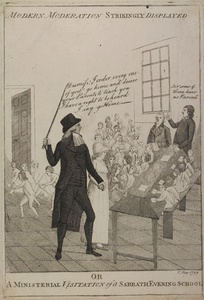| Method | Etching and stipple |
| Artist | John Kay |
| Published | [John Kay, 1799] |
| Dimensions | Image 185 x 124 mm, Plate 187 x 127 mm, Sheet 194 x 133 mm |
| Notes |
A caricature depicting William Moodie, Professor of Hebrew at Edinburgh University, standing and holding a young girl's hand. He stands to right, wearing dark clothes and a round hat, a cane in the air, saying, Dismiss! I order every one of you! go home and desire your Parents to teach you I have a right to be heard I say go Home - Two schoolmasters stand at the farther end of the long desk, and on the extreme right, one says, Sir! some of them have no Parents. A group of young children sit at a long sloping desk, another group sit in the corner, while another group leave through a door to the left. Lifetime impression. The General Assembly in Scotland had condemned Sunday schools as hot-beds of disaffection and in their 'Pastoral Admonition' of 1799 described their teachers as 'persons notoriously disaffected to the civil constitution of the country'. In several places schools were accordingly suppressed. Dr. William Moodie of St. Andrew's Church, Edinburgh, Professor of Hebrew in the University, having been asked by the teachers to inspect (and approve), instantly ordered the pupils to disperse. John Kay (1742-1826) was a Scottish miniature painter, satirist, and engraver, chiefly celebrated for his caricatures of many of the most notable Scotsmen of his day. Born in Dalkieth, the son of a Mason, he was orphaned at a young age, and following an unhappy childhood with his mother's relatives in Leith, he was apprenticed to the barber, George Heriot. After six years working under Heriot in Dalkieth, he moved as a journeyman barber to Edinburgh. In 1771, he joined the Corporation of Barber Surgeons, gained the freedom of the city, and set up his own barbershop. Despite having no formal training in, and no great talent for, the finer points of artistic pursuits, he pursued his drawing with dedication. Kay's quick hand and canny wit made him a natural satirist, and the remarkable likenesses of his earlier portraits to their real world counterparts began to be noticed by his customers. The most important of these was William Nisbet of Dirleton, who would eventually become his patron. Nisbet's death in 1784 brought Kay a small annuity, which enabled him to give up his barbershop, and focus his full attentions on his art. From a small shop in Parliament Close, Edinburgh, Kay issued his portraits. Redgrave attributes to Kay almost nine hundred plates, which constitute an unparalleled chronicle of Edinburgh life at the turn of the eighteenth and nineteenth centuries. Kay's portraits, though objectively of only slim artistic merit, are warm, lively, and in some cases, bitingly clever. His talent for provoking his subjects was famous, leading on one occasion to a failed prosecution, and on another to an apparent cudgeling. Despite this, Kay's star continued to rise. In 1811 and 1816, his work was exhibited by the Edinburgh Associated Artists, and in 1822, he contributed to the Institution for the Encouragement of the Fine Arts in Scotland. As early as 1792, he had planned to release a collection of his works in book form, along with a short biographical sketch that supplies almost all of the known details of his life, but the project remained unrealized at his death. It was not until 1837, almost a decade after his death, that a collection of 340 of his plates were first published. BM Satires 9453 Ex. Col.: Hon. Christopher Lennox-Boyd Condition: Small ink stain above the letter 'D' in the word 'Displayed', margins trimmed to just outside the plate mark, repaired tear upper right corner, faint crease upper right corner. |
| Framing | mounted |
| Price | £100.00 |
| Stock ID | 42391 |

